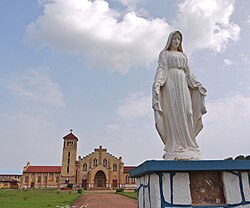
The Republic of Rwanda is a secular state that does not have a state religion . The country's constitution protects the rights of citizens to choose or change their religion and prohibits discrimination on the basis of religion. Notwithstanding the principle of secularism set forth in the constitution (Article 1), upon assuming office, the President of the country, government ministers and members of the government, senior army officers, judges of the Supreme Court, the Attorney General and some other senior officials are obliged to make an oath that ends with the words: “ And God help me. ”
The majority of Rwandans (93.4%) profess Christianity [1] .
Christianity

The first Christian missionaries in Rwanda were members of the Catholic society of the White Fathers , who arrived in the region in 1889.
In the first half of the 20th century, missionaries from Protestant churches — Lutherans , Adventists , Presbyterians , and Anglicans — also arrived on the territory of Rwanda. Since 1938, Baptists have been active in Rwanda, since 1940 - Pentecostals .
In 1960, the proportion of Christians in the population of Rwanda was 28%, by 1980 this figure had risen to 62% [2] . In 2000, there were 7.6 thousand Christian churches in the country, belonging to 35 different Christian denominations [2] .
In 2010, the number of Christians in Rwanda reached 9.92 million [3] . The Catholic Church unites 5.26 million people in the country; The largest Protestant denominations are Anglicans , Adventists, and Pentecostals (more than a million believers each).
Christianity in the country is practiced by the majority of Hutus , Tutsis and Nkolos , as well as the British, French, Belgians and some Arabs living in Rwanda. Among the Tyva pygmies, the proportion of Christians is only 9%.
Islam
Islam has been present on the territory of Rwanda since the beginning of the 20th century. In 1913, the first mosque was built in the country. In 1964, the Rwandan authorities recognized the Association of Muslims in Rwanda . After the 1994 genocide, the press reported on the massive conversion of Rwandans to Islam. In 2001, Sheikh Salih Hategekimián claimed that Muslims make up 18 percent of Rwanda’s population; The New York Times newspaper estimated the proportion of Muslims at 15% [4] ; Washington Post at 14% [5] . However, these figures have not been confirmed in subsequent studies. In the course of the general census of the population in 2002, only 1.8% of Rwandans identified themselves as Muslims [6] ; The same figure is contained in the report of the Pew Research Center for 2010 [7] . According to the World Christian Database, in 2010 Muslims made up 4.8% of Rwandans [8] .
By ethnicity, most Muslims are Arabs and Swahili . All of them are Sunni and adhere to the Shafi'i law school. Among the Indians living in Rwanda are Shiite Ismailis and Sunni Hanafis . Islam in Rwanda is the country's only “urban” religion; over 60% of Muslims are citizens. A third of Rwandan Muslims live in the city of Kigali . Much of the Muslims live in the Eastern Province .
Local Beliefs
The share of supporters of local autochthonous beliefs is steadily declining. According to the World Christian Database, in 2010, 3.3% of Rwandans adhered to local beliefs [8] . These are mainly representatives of the Twa peoples; residents of remote rural settlements, mainly in the Northern Province . Part of local beliefs is animism and the cult of ancestors .
Other religious groups
In 1953, a Bahá’í group arrived in the country from Uganda. In 1972, the National Spiritual Assembly of Rwanda was formed. According to the World Christian Database in 2005, 19,000 Baha'is lived in Rwanda [9] .
Among the Jews living in Rwanda there are supporters of Judaism ; they are all foreigners. Gujarati people who live in Rwanda confess Hinduism (500 people).
The proportion of non-believers is 0.2% [8] .
Notes
- ↑ Christian Population as Percentages of Total Population by Country (not available link) . Pew Research Center (January 2011). The appeal date is March 7, 2014. Archived on January 7, 2012.
- ↑ 1 2 Patrick Johnstone, Jason Mandryk. Rwanda // Operation World 2001 . - London: Paternoster Publishing, 2001. - 798 p. - (Operation World Series). - ISBN 1-8507-8357-8 .
- ↑ Christian Population in Numbers by Country (English) (inaccessible link) . The Pew Forum on Religion & Public Life (19 December 2011). The date of circulation is March 7, 2014. Archived April 30, 2013.
- ↑ Marc Lacey. Ten Years After Horror, Rwandans Turn to Islam (English) . The New York Times (April 7, 2004). The appeal date is March 7, 2014.
- ↑ Emily Wax. slam Attracting Many Survivors of Rwanda Genocide (eng.) . The Washington Post (September 23, 2002). The appeal date is March 7, 2014.
- ↑ FINAL RESULTS: STATISTICAL TABLES (English) . 3rd GENERAL CENSUS OF POPULATION AND HOUSING OF RWANDA - AUGUST 2002 . National Institute of Statistics of Rwanda (November, 2003). The appeal date is March 7, 2014. (unavailable link)
- ↑ The Future of the Global Muslim Population (English) (inaccessible link) . Pew Research Center (January 2011). The date of circulation is March 7, 2014. Archived on February 11, 2014.
- ↑ 1 2 3 Rwanda (English) . The Association of Religion Data Archives. The appeal date is March 7, 2014.
- ↑ Most Baha'i Nations (2005) (English) . The Association of Religion Data Archives. The appeal date is March 7, 2014.
See also
- Christianity in Rwanda
- Protestantism in Rwanda
- Association of Pentecostal Churches of Rwanda